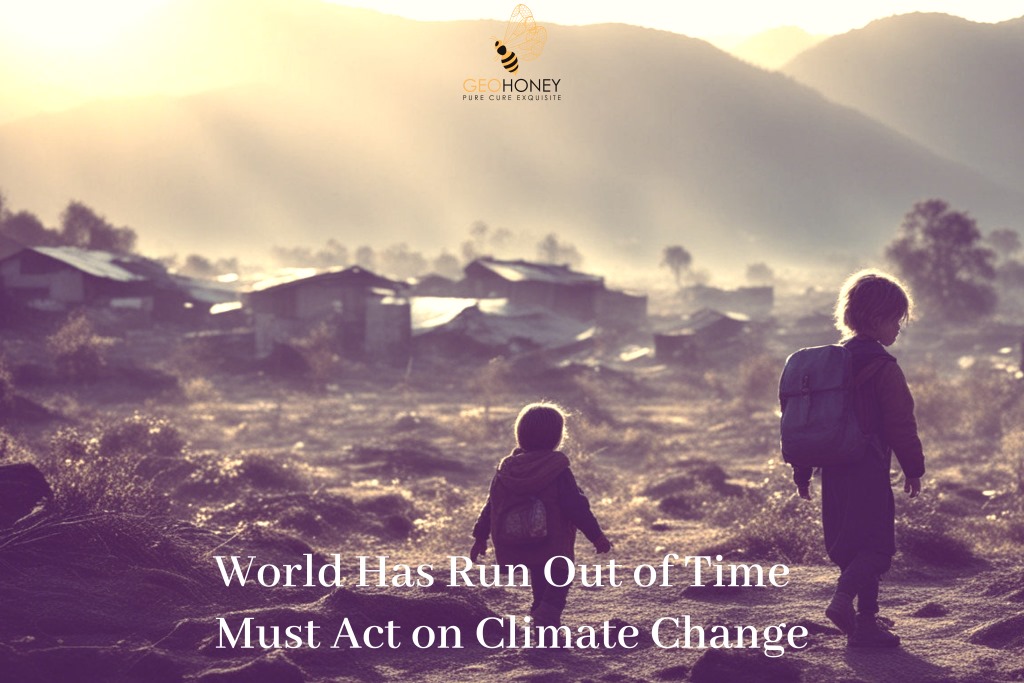- Tokyo: 20:06
- Singapore: 19:06
- Dubai: 15:06
- London: 11:06
- New York: 06:06
The World Has Run Out of Time & Must Act on Climate Change Immediately

This week, the United Nations issued "General Comment No. 26," which focused on children's rights and the environment, with a particular emphasis on climate change. The declaration, which has been in the works for years, declared that the depth and magnitude of the triple catastrophe of climate emergency, biodiversity collapse, and pervasive pollution is an urgent and systemic threat to children's rights globally.
The observations were made by the UN Human Rights Commission's Committee on the Rights of the Child, which emphasised the obligation of governments worldwide to address environmental harm and climate change, and added that children worldwide have a fundamental right to a clean, healthy, and sustainable environment.
While GC26 did not suggest anything innovative or novel, it did highlight an important concept and truth that is often buried in the commotion around climate change.
Numerous international leaders, both political and business, as well as activist organisations and institutions, have spoken out about the importance of leaving future generations a sustainable, clean, and healthy planet. Unfortunately, such pronouncements, at least from persons like political and business leaders, have become the norm, with little more than hot air added to global warming. The vast gap between statements and actions, as well as the overall failure to meet numerous commitments, particularly by developed nations, which are essentially at the root cause of the current climate emergency, mean that the planet's ability to be inhabitable and safe, not just for humans but for all living beings, in the near future is now in doubt.
The global community has set the globe on a steep downhill slope towards climate disaster by repeatedly failing to meet commitments for reducing carbon emissions and subsidising impoverished nations' adaptation and mitigation to climate change impacts.
This has raised major concerns about what the next generation will inherit, let alone future generations. With the globe on track to miss the 2030 targets for climate change and sustainable development by a wide margin, the future appears to be getting bleaker by the day.
The proportion of children and youths in global populations is increasing, owing primarily to growing populations in the developing world, particularly South Asia and Africa, particularly Sub-Saharan Africa. According to several projections, the under-14 population would grow from 1.98 billion in 2020 to 2.6 billion by 2050. When the population of those under the age of 25 is included, the figure approaches 3.5 billion.
The world population is anticipated to reach 11 billion by the turn of the century, implying that the Earth would be occupied by many more people, with more than two-thirds, if not 75 percent, living in poor countries. This casts doubt on their fate, as present trends predict that global temperatures will rise by 2.5 degrees Celsius above pre-industrial levels, even on a conservative estimate. The more severe estimates, which appear to be significantly more plausible given the current situation, predict that the temperature will rise by 3.5 degrees Celsius.
This is almost guaranteed to have catastrophic consequences for everything on Earth, from water, food, and habitat to health, employment, and general human well-being. And the less stated about other living beings' fates, the better. Biodiversity, forests, and oceans might all be annihilated, rendering the earth unsuitable for all kinds of life.
This may appear to be an extreme scenario, but there are enough indications and even evidence that the world is undoubtedly heading in that direction unless global leaders — that is, billionaire business leaders and powerful political leaders of the rich world — wake up now or pretend that they are no longer asleep. It is no longer sufficient to just have more agreements, announcements, and commitments.
The time has come for action — concerted, concentrated action. It cannot be put off for a year or even a few months. The West must take its obligations seriously and begin doing the necessary things, such as making at least $1 trillion accessible to developing nations each year to allow them to implement mitigation and adaptation measures. The West must also take immediate and drastic steps to reduce its own emissions in order to compensate for previous excesses.
Both of the West's actions will undoubtedly be painful and detrimental to their economies and people. But this is only a temporary setback; they will be able to overcome it in a few years. But if they do not make these sacrifices, primarily to atone for their excesses over the last 150 years, they, like the rest of the globe, will pay a far more painful and long-lasting price.
UN Secretary-General Antonio Guterres has already chastised world leaders, particularly Western leaders, for lying about their promises to climate change mitigation. Unfortunately, there is no longer any room, space, or time for deception. If they do not act now, they will put the world, their own children, and future generations at risk of extinction.
Source: arabnews.com




Youth are the future generation. if we don't act now, there will be no future for the future generation as well. So we must act now, before it's too late.